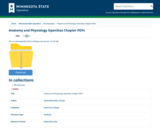
These are PDFs of each chapter of the OpenStax Anatomy and Physiology textbook. They can be posted to D2L for easy access for students.
- Subject:
- Biology
- Life Science
- Material Type:
- Textbook
- Provider:
- Minnesota State Opendora
- Date Added:
- 11/30/2020

These are PDFs of each chapter of the OpenStax Anatomy and Physiology textbook. They can be posted to D2L for easy access for students.
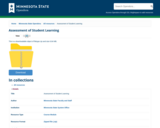
This is a downloadable object of filetype zip and size 6.84 MB.
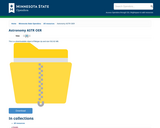
Full course with supplemental materials based upon the OpenStax Astronomy textbook.
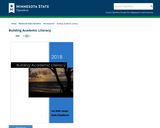
While many study skills, composition and reading skills texts separate these activities into discrete skills to be learned separately, this books recognizes that these skills are interconnected. A student who struggles with the reading will have a hard time writing about it or discussing it. A student who has inadequate strategies for listening to lectures will struggle to see the connections between the lecture and the reading. Therefore, this book moves away from the “skills and drills” texts that are so common in reading and writing textbooks. Instead, this book features process and provides opportunities for students (and instructors) to think about the best ways to approach academic tasks. For example, a “skills and drills” oriented book might teach students how to take Cornell Notes and use graphic organizers, but it does not provide any information for students that would allow them to decide when it would be best to choose one note taking method over the other. This book’s main focus is helping students develop that sort of judgement.
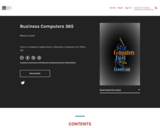
Short Description:
Intro to Computer Applications or Business Computers for Office 365
Word Count: 40014
(Note: This resource's metadata has been created automatically by reformatting and/or combining the information that the author initially provided as part of a bulk import process.)
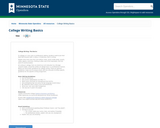
This is a resource to give to students about expectations for college writing, including links and resources for writing papers, emails, and more in an academic and professional manner.
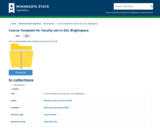
This is a downloadable object of filetype zip and size 20.51 MB.
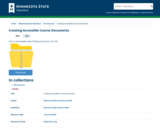
This is a downloadable object of filetype zip and size 12.57 MB.
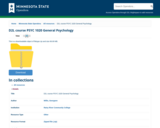
D2L course PSYC 1020 General Psychology zip files.
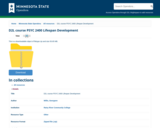
D2L course PSYC 2400 Lifespan Development zip file by Georgann Wills.
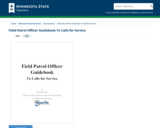
The basis for the development of this guidebook came about after a publisher had discontinued a text I had been using for a number of years in my patrol operations course. The text Police Officer’s Response Guide to Crimes/Incidents in Progress: by Nate Tanguay was designed for field patrol officers to have a reference book they could use in the field to assist then while on calls. Over the years I have had my students use this text and put in updated response concepts for call for service, as well as, specific state laws, paperwork requirements and other required duties for specific calls. With the discontinuation of the text, I made the determination to create my own guidebook with the updated response concepts that are being taught in law enforcement and reclassifying each call for service under the new National Incident Based Reporting System (NIBRS) that the FBI will be implementing by 2021. With this project I was able to participate in Minnesota State Open Educational Resource (OER) Faculty Development to assist me in the development of this guidebook.
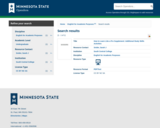
This book is an accompaniment to the OER text How to Learn Like a Pro by Phyllis Nissila. I used this text in an English for Academic Purposes course at South Central College in Faribault, Minnesota. During this process, I developed a number of supplemental activities and have published those activities in this book. This book is intended to be used in coordination with How to Learn Like a Pro.
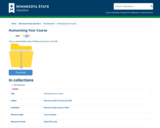
This is a downloadable object of filetype zip and size 10.64 MB.
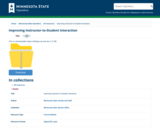
This is a downloadable object of filetype zip and size 2.71 MB.
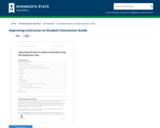
The Improving Instructor-to-Student Interaction using D2L Brightspace Tools short course is designed to
allow participants to navigate through the course at their own pace. The course is online and
asynchronous. The course focuses on introducing and re-introducing the use of specific D2L Brightspace
features and tools (including Classlist, Email, Intelligent Agents, and private Discussions) to improve
instructor-to-student interactions in an online course.
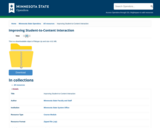
This is a downloadable object of filetype zip and size 4.61 MB.
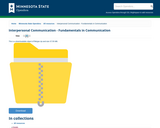
This is a D2L Brightspace module covering the foundations of communication . This is used as an introduction to an interpersonal communications course.
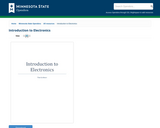
The advent of electronics has had a profound impact on our lives and impacted nearly every product that we use either directly or indirectly. Without electronics, present day computers, cell phones, stereos, televisions, and the internet would not be possible. And of course, without computers and modern communications tools, society could not have made the huge strides in fields such as medicine, aerospace technologies, meteorology, transportation, agriculture, education, and many others. It is for these reasons that the invention of the transistor is considered as one of the most important technological advancements in history.
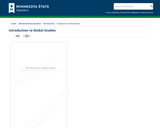
This textbook introduces students to the basic concepts, trends, perspectives and interconnections of global society. Through readings, discussions, videos, webcasts and other activities, students examine the interdependence of people around the world and global issues that affect these relationships. It will provide an overview of the history and theoretical approaches that have created a global society through topics such as global politics, human rights, the natural environment, population, disease, gender, information technology, war and peace. This is a required course for the Global Studies Emphasis.
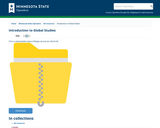
This course introduces students to the basic concepts, trends, perspectives and interconnections of global society. Through readings, discussions, videos, webcasts and other activities, students examine the interdependence of people around the world and global issues that affect these relationships. It will provide an overview of the history and theoretical approaches that have created a global society through topics such as global politics, human rights, the natural environment, population, disease, gender, information technology, war and peace. This is a required course for the Global Studies Emphasis.